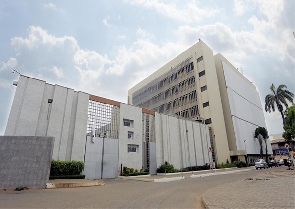 The Bank of Ghana Headquarters
The Bank of Ghana Headquarters
The Central Bank says it has noted that the domestic economy of Ghana, just like other African countries, still faces relatively tight global financing conditions, emerging risks in the global financial system and heightened uncertainty about the global economic outlook.
According to Governor of the Bank, Dr. Ernest Addison said effects of these risks, on the domestic economy, could be amplified by inherent vulnerabilities including structural excess liquidity following the completion of the Domestic Debt Exchange of government and the widening negative output gap.
Addressing journalists at the 111th Monetary Policy Committee press briefing on March 27, the Governor explained that macro-prudential risk assessments conducted during the last MPC meeting held in January this year indicated increased pressure on the profitability and solvency of banks prior to the implementation of the DDEP.
“The preliminary data available at this MPC, show that the pre-pandemic capital buffers in the banking sector have been weakened somewhat by the recent macroeconomic challenges and the DDEP, although banks remain liquid," he noted.
Dr. Addison continued, “These require contingency measures by banks, supported by the regulatory reliefs to contain potential risks to financial stability. The Bank of Ghana will continue to monitor these developments going forward, and stands ready to act very swiftly to safeguard the stability of the financial sector.”
Meanwhile, the Monetary Policy Committee of the Bank of Ghana has announced a hike in the policy rate by 150 basis points to 29.5 percent from an earlier 28 percent announced in January this year.
Governor of the Bank, Dr. Ernest Addison explained that the hike is due to rising inflationary shocks which are expected to persist as Ghana awaits an IMF-supported programme.
MA/FNOQ